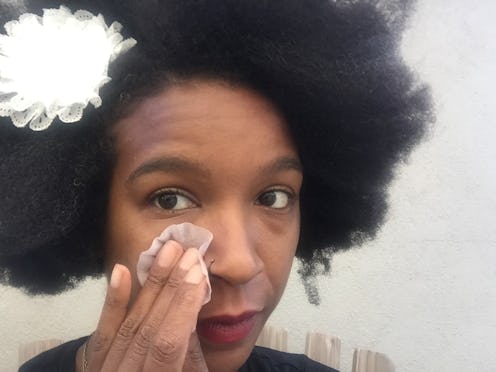
For years, I never left home without blotting papers in my purse. It didn’t take long for my face to start producing oil like it was preparing for a drought. I was spending a small fortune on those little sheets, but finally, I've found an alternative to oil-controlling blotting papers: a customized recipe for DIY oil-controlling sheets that are affordable and super easy to make.
Oily skin gets a bad rap, but it’s important to remember that your natural oil serves a purpose: As Bustle’s Jen Marie points out in this article, there are plenty of benefits to having oily skin. Sebum glands are there to protect us from damage that can harm our skin, and oil production is essential to keeping our complexion vibrant. The downside to our bod’s natural instinct to protect the skin is excess oil production, which is known to cause breakouts. As Cosmopolitan reported, the overproduction of oil can lead to clogged pores, aka the perfect environment for bacteria to grow. This puts babes in a precarious predicament of trying to control oil without getting rid of it all together.
When oil is piling up on our face, it’s easy to put the blame on the weather, but putting the right ingredients in our bodies is just as important as what we’re applying topically. Oil-free blotting papers deter us from reaching for an extra-drying cleanser that will strip our face of its essential nutrients. Peep this recipe below to reap all the benefits of homemade blotting papers so you can keep the privilege of having oily skin.
To make these papers, you'll need:
- Tissue Paper
- Lavender Tea Tree Essential Oil
- Empty Compact (or another small container)
- Arrowroot powder (optional)
This recipe is great because you can personalize the ingredients to suit your preference or facial needs. Let's start with the paper itself: You can get real fancy and make your own rice paper, or you can purchase super cheap, dye-free eco-friendly tissue paper. If you want to make this recipe even more inexpensive, you can even use toilet-seat covers, as this blogger suggests.
In addition to the various paper types, you can customize the oil blend to suit your face's specific needs. You can also use different oil-controlling essential oils like tea tree or lavender which are more gentle for combination skin. To see which essentials measure up against oil, check out this list of essential oils known to combat acne. For these homemade blotting papers, stick to the three essential oils provided as these don't require heavy dilution. Other oil-controlling essential oils like lemongrass absolutely need to be diluted properly or else you can cause irritation.
Start by tracing the outline of your compact or container onto a bundle of tissue sheets and carefully cut around the perimeter. You won't need to cut each sheet individually, but don't cut too many at once to avoid jagged edges.
Once you've cut enough sheets to fill your container, place them directly inside. Add five drops of lavender tea tree essential oil. Since I have about 50 sheets in my container, I used five drops, then flipped my sheets to make sure the oil reached the ones at the bottom. The oil will go through most of the sheets, but you may need to alternate the middle sheets to ensure they get all the oily goodness of essential oils. While I've made this recipe with a drop per sheet before, I strongly recommend going less is more until you see how much oil is absorbed through each sheet.
For those looking for some powder power, add about 1/2 teaspoon of arrowroot powder to the container after you're finished with the essential oil. The powder can be good for those with lighter skin tones and extremely oily skin to absorb extra oil, but it isn't completely necessary. Shake well and flip the sheets to get the ones at the bottom if necessary.
Let the sheets dry naturally and use the sheets when oil starts to build up by gently wiping your T-zone or extra-oily areas. Be sure to do a test patch if you're using new essential oils on the inside of your elbow and don't leave home without your new trusty oil-absorbing papers.